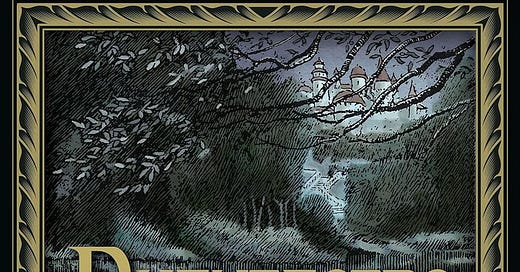This week I want to share with you a book that has come to mean more and more to me over the years: George MacDonald’s Phantastes.
MacDonald was a Scottish Anglican priest who wrote a variety of Fairy Tales, realist (ish) novels, and sermons. He’s perhaps the most important author to C.S. Lewis. In The Great Divorce, Lewis’s miniature version of the Divine Comedy, MacDonald plays both Virgil and Beatrice as he guides the narrator through Heaven to watch the conversations that take place there. Lewis so highly regarded MacDonald that he even made a compilation of his best quotes in the George MacDonald Anthology. But perhaps Lewis’s highest praise is reserved for Phantastes.
Lewis had picked up a copy of the book at a train station bookstall. He was seized by the beauty of the work. In Surprised by Joy, Lewis finishes his account of his encounter with Phantastes with these words, “That night my imagination was, in a certain sense, baptized; the rest of me, not unnaturally, took longer. I had not the faintest notion what I had let myself in for by buying Phantastes.”
The book is a strange one, and perhaps not for everyone. I’m reading it now with some of the parents at the school where I work, and they need the help of someone who has been here before. Some love it, but struggle to say why. I hope I’ll be able to help them put some words to the why. I certainly know why I love it.
The story follows the tale of a young man on his 21st birthday. He finally comes into his inheritance, both his parents being dead. As part of that, he opens his father’s old study, opens an old secretary desk, and discovers in an secret compartment his (many times) great-grandmother who turns out to be a fairy. The rest of the book follows Anodos, whose name mean pathless, as he attempts to find his way through Faërie. He falls in love, discovers a gift for verse, sins, and find himself again. It is a beautiful book, strange and mysterious.
I love this book because it is so many things at once. It is part Dantean, part Victorian, part Arthurian. We meet fairies, kobolds, living trees, goblins, and more. And I at least find myself in young Anodos, though I am now sixteen years his senior. His struggles are, in many ways, mine. His attempts at solutions fail as mine often do too. And I can only hope that I find myself in a similar conclusion.
If you love the works of Lewis and Tolkien then you should take up Phantastes. He is, if not the father, then the grandfather of modern fantasy. Take up Anodos’ path and see where it leads you. You may just find yourself in the end.






Incredible book. The imagery is seared into my memory more than anything (the wooden idol, the forbidden door in the cabin, etc.)
I was in the middle of Midsummer Night's Dream when I read this. Looks like a great book. We need more fairies in our Christian theological vision.